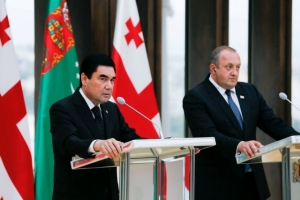Georgia and Turkmenistan Coy on Energy Speculation
Last week the central streets of Tbilisi were decorated with national flags of Turkmenistan and Georgia as the capital of Georgia hosted a high-ranking delegation from the Central Asian state. Similar to the visit of Vladimer Lukashenko, President of Belarus, the visit of President Gurbanguly Berdimuhamedow was not announced in advance, stirring speculation that some kind of sensational declaration was to be made. Alas, it was not to be.
The declaration summarizing the visit, which was signed at the President’s Avlabari residence, clearly showed that Georgia and Turkmenistan have a long way to go in their cooperation. However, it was clearly felt that the official Ashgabat delegation led by President Berdimuhamedow started a new energy dialogue. At the concluding press conference, President Berdimuhamedow’s responses indicated that gas, which goes to the west via Russia, might soon change route and go via the Baku-Ceyhan pipeline. Back in the 1990s, Georgia’s second president Eduard Shevardnadze tried to convince then Turkmen President Saparmurat Niyazov of the benefits of transiting gas via Georgia, avoiding Russia. Although Shevardnadze toiled to convince his Turkmen counterpart to give up the multi-million Russian deal. However, it was obvious that operating the new energy corridor was much more beneficial for Turkmenistan. Back then, President Berdimuhamedow’s predecessor refused to worsen relations with Russia.
In the recent visit, President Berdimuhamedow had a detailed discussion about the gas pipeline with Prime Minister Irakli Garibashvili. However, after the end of the meeting, neither Prime Minister Garibashvili nor President Berdimuhamedow spoke about the issue, offering only general phrases, which touched upon modernization of transit corridors. However, in the joint declaration, for the first time it was written that citizens of Turkmenistan and Georgia are “brother nations” and that deepening relations between their peoples is also of strategic importance. Moreover, it was written in the declaration that Georgia will provide full support to Turkmenistan in the transit corridor issue. Turkmenistan meanwhile promised that during voting at the United Nations, it will support the return of Georgian IDPs to Abkhazia and South Ossetia.
After signing the declaration, President Berdimuhamedow brought flowers to the memorial of those who died fighting for territorial integrity. This gesture clearly implied a diminishing harmony between Ashgabat and Moscow and it also suggested that Georgian-Turkmen relations, which were once quite tense because of consumed gas debts, are improving.
In only two years, the debt of consumed gas exceeded $400 million. Georgian thermo electric power stations used to work fully on Turkmen gas, which increased the amount of debt even more. Of the debt accumulated in 1991-1993, Turkmenistan wrote off $50 million in 1999 and out of the remaining $350 million President Niyazov agreed to write off only part, which was used to repair the Turkmen Su-25 at the Tbilisi Aviation Factory.
Since 1999, the debt to Turkmenistan has been gradually paid back through repairing Turkmenistan’s aircraft at Tbilaviamsheni and by sending sugar and other Georgian products to Turkmenistan. The debt decreased to $193 million and during the rule of President Saakashvili, in 2006, it was fully covered. The epoch of Turkmen gas, which was provided to Georgia by the Russian company “Itera”, is now over and the political elite appeared to have forgotten Turkmenistan altogether.
However, assessing the unexpected recent visit of Turkmenistan’s president to Georgia, all observers came to the conclusion that President Berdimuhamedow’s visit was not merely a symbolic gesture and that relations between the two post-Soviet states may well be in transit towards a new energy relationship, one that would seriously irk Russia.
Zaza Jgharkava












